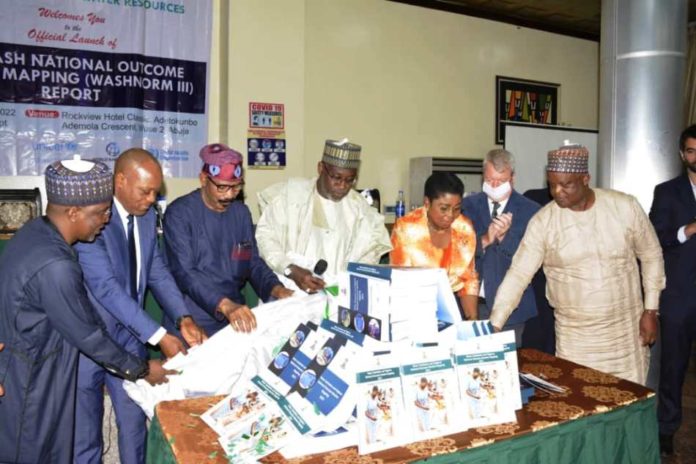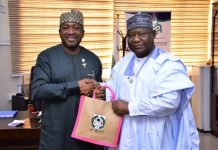
The Honourable Minister of Water Resources, Engr. Suleiman H. Adamu FNSE, FAEng has disclosed that the 2021 Water, Sanitation and Hygiene National Outcome Routine Mapping (WASHNORM III) focuses on the status of Urban Water Utilities with deep injection of Local resources to attend to Nigeria’s specific needs.
Engr. Adamu made this known at the unveiling and launch of 2021 WASHNORM 111 report, on Tuesday 21st June 2022 in Abuja.
He recalled that WASHNORM was borne out of the need for comprehensive data on WASH to effectively monitor the advancement of SDGs 6.1 and 6.2, with the prime goal of making available comprehensive and high-quality data for iterative planning, priority setting, effective resource mobilization and other critical decision-making support in the WASH sector.
The Minister revealed that the Ministry in collaboration with UNICEF and National Bureau of Statistics successfully implemented WASHNORM 1 which was launched in May, 2019 adding that the survey was the largest and most robust WASH survey ever implemented in the history of Nigeria.
Speaking further, Engr. Adamu revealed that WASHNORM 11 was launched in November 10, 2020, and due to lessons learned from the previous editions (WASHNORM 1 & 11) there are refinements in the scope and methodology of the WASHNORM 111He noted that the salient perspectives of the report presents that access to basic water supply services is available to 67 % of the population and at 92 % access levels, the richest households are twice more likely to use basic water supply services than the poorest households with 46 % and disparities between urban areas (86 %) and rural areas (57 %).
The Minister also revealed that the most common sources of drinking water recorded by households were boreholes/tubewells used by 37 % of the household members and only 11 % of the household population use pipe-borne water, and just 4 % use water from a source that is piped into their premises.
Speaking on access to sanitation indicators across the country, the Minister noted that the report shows a slight improvement, although Open Defecation is still prevalent. He added that 23 % of the population (48 million people) still defecates in the open stressing that people in rural areas (31 %) are four times more likely to practice Open Defecation than those living in urban areas (8 %), while the poorest households (48 %) are 48 times more likely to practice Open Defecation than the richest households (1 %).
He further said Forty-six (46) % of the population was found to have access to basic sanitation services in 2021 compared to 44 % in 2019, and despite the increase in the number of people with access to basic sanitation services, the proportion of people practicing Open Defecation has barely changed since 2019, with the number increasing from 46 million in 2019 to 48 million in 2021.
Engr. Adamu further noted that the survey showed a slight increase in access to hygiene services between 2019 and 2021 as 17 % of the population used basic hygiene services in 2021 compared to 16 % in 2019, with notable disparities between urban (25 %) and rural (13 %) areas. He added that only 28 out of the 36 states have Urban Water Utilities or State Water Agencies (SWA) with only 16 states with fully functioning urban utilities or SWA, while 12 were partially functioning.
He noted that many State Governors are yet to complement the efforts of the Federal Government in terms of provision and sustenance of WASH infrastructure across the Country and emphasized the need for a comprehensive approach to WASH which must include expanding safe and reliable water systems, providing direct investments or promoting household investments in sanitation facilities that involves Community-level health and hygiene awareness campaigns.
The Minister, who recognized the support and collaboration of National Bureau of Statistic, UNICEF and other Development Partners urged the State Governors to key into the Water and Sanitation programmes (PEWASH, ODF Roadmap, Clean Nigeria Campaign, WASH Sector Revitalization Plan and the Sustainable Urban and Rural WASH-SURWASH) targeted to address all the challenges highlighted in the report.
The Permanent Secretary, Federal Ministry of Water Resources, Mrs. Esther Didi Walson-Jack mni in her welcome address stated that the objective of WASHNORM was to make available comprehensive, dynamic and high quality data for proper planning, priority setting, effective resources mobilization and other critical decision-making support in the WASH sector to fast track the attainment of SDG 6.
Mrs Walson-Jack noted that WASHNORM has been globally accepted as a major and reliable source of WASH data in Nigeria and added that the launch of WASHNORM 111 report will provide opportunity to move the sector forward with recommendations.
The Statistician-General of the Federation, Mr Semiyu Adeniran said the inauguration of the report represents an important milestone in the National Bureau of Statistics’ data strategy that will be beneficial to policy and decision makers, development partners, researchers and the wider public, and also serve as a tool to measure Nigeria’s Sustainable Development Goals (SDGs).
The UNICEF Country Representative, Mr. Peter Hawkins expressed great delight in the launch of WASHNORM 111 report and stated that WASH has huge impact on other sectors such as health, environment and education adding that the WASH Sector gets better by the day in Nigeria.
The high point of the occasion was the unveiling and official launch of the WASHNORM 111 report by the Honourable Minister of Water Resources Engr. Suleiman Adamu, accompanied by the Permanent Secretary Mrs Didi Walson-Jack, the Minister of State for health Dr Olorunibe Mamora, the Statistician of the Federation Mr Semiyu Adeniran, the UNICEF Country Representative Mr Peter Hawkins, Chief of WASH Jane Bevan and other dignitaries present.
Mrs. Funmi Imuetinyan
Deputy Director (Press and Public Relations Unit)





